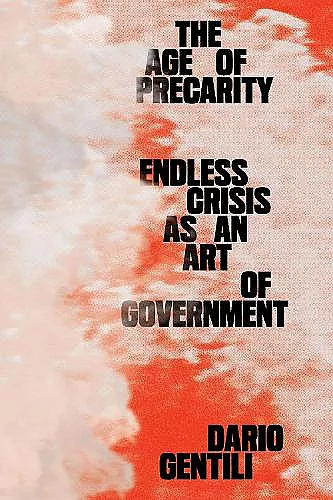The Age of Precarity
Endless Crisis as an Art of Government
Format:Paperback
Publisher:Verso Books
Published:10th Aug '21
Should be back in stock very soon

In The Age of Precarity, the author explores the persistent crises in modern society and the need for political alternatives amidst ongoing instability.
In The Age of Precarity, the author examines the pervasive nature of crisis in contemporary society, arguing that what was once viewed as temporary setbacks have morphed into a permanent state of instability. The economy, politics, and individual lives are all deeply affected by this ongoing turmoil, which has been exacerbated by fluctuations in the labor market and the erosion of social and political connections that were once taken for granted. This book delves into the historical context of crisis, tracing its evolution from ancient Greece to the present neoliberal landscape, where it has transformed into a tool for social control and governance.
The narrative explores how the concept of crisis has shifted over time, presenting it as a choice between revolution and conservation, a notion that is increasingly irrelevant in today's context. The author draws on a wide range of philosophical and political thought, referencing figures from Plato to Hayek, and highlights how the crisis has become a means of administering discipline within society. By analyzing the interplay between precariousness and governance, The Age of Precarity reveals the underlying structures that perpetuate this state of crisis.
Ultimately, the book poses a critical question: How can we envision and create political alternatives in a world dominated by crisis? By engaging with the works of thinkers like Benjamin and Foucault, the author seeks to understand the implications of living in a state of perpetual uncertainty, while also inspiring readers to consider the possibilities for change and transformation in their own lives and communities.
Dario Gentili's book on crisis is one of the first genealogies of a concept that nowadays is crucial. In this way, through the rigorous analysis of the term, he captures an uncharted aspect of our contemporary condition -- Roberto Esposito
There is a crisis, there is no alternative. This is the rhetorical strategy through which governments across the world justify and legitimize unpopular political and economic decisions in this age, the age of precarity. Dario Gentili's illuminating genealogical reconstruction of the dispositive of crisis is an indispensable tool to understand and contrast the very specific art of government implicit in today's globally predominant neoliberal policies."}" data-sheets-userformat="{"2":513,"3":{"1":0},"12":0}" style="font-size: 10pt; font-family: Arial;">There is a crisis, there is no alternative. This is the rhetorical strategy through which governments across the world justify and legitimize unpopular political and economic decisions in this age, the age of precarity. Dario Gentili's illuminating genealogical reconstruction of the dispositive of crisis is an indispensable tool to understand and contrast the very specific art of government implicit in today's globally predominant neoliberal policies. -- Elettra Stimilli
Dario Gentili's superb The Age of Precarity takes a concept ubiquitous in contemporary left political and social theory, precarity, and endows it with new life and explanatory power. Deftly drawing on thinkers from Plato to Benjamin, Gramsci to Foucault, Schmitt to Hayek, Gentili diagnoses a present where crisis generates an 'art of government' of precarious life, and calls against a politics as a fight-to-the-death between forms of life, for a new politics of shared forms of life through which power is expressed in common. -- Matteo Mandarini, Queen Mary University of London
Dario Gentili's book on crisis is one of the first genealogies of a concept that nowadays is crucial. Through the rigorous analysis of the term, he captures an uncharted aspect of our contemporary condition. -- Roberto Esposito, author of Communitas
"There is a crisis, there is no alternative." This is the rhetorical strategy through which governments across the world justify and legitimize unpopular political and economic decisions in this age, the age of precarity. Dario Gentili's illuminating genealogical reconstruction of the dispositive of crisis is an indispensable tool helping us to understand and contrast the very specific art of government implicit in today's globally predominant neoliberal policies -- Elettra Stimilli, author of Debt and Guilt
Dario Gentili's radical and rigorous work offers a magisterial analysis of the figure of crisis, which so much seems to define our current socio-political situation. By tracing an intellectual counter-history of this concept and proposing a novel theorization of it as an art of government, The Age of Precarity stands out as a benchmark text across contemporary debates in critical thought and one that we need to understand present-day practices of administration under neoliberal governance. -- Andrea Mura, Goldsmiths, University of London
Dario Gentili has, through an analysis of the language of crisis, shown how its inscription into the discourse of contemporary politics has diminished its force. The language of crisis has been legitimized. In its place he proposes a rethinking of conflict. The political is then recast in terms of life. Freed of the debilitating effect of the equation of life with the biological Gentile proposes a genuine biopolitics. The point of departure is the recovery of that which has been rendered precarious in the name of a new form of commonality. -- Andrew Benjamin, University of Technology, Sydney
ISBN: 9781788733809
Dimensions: 210mm x 140mm x 10mm
Weight: 160g
160 pages